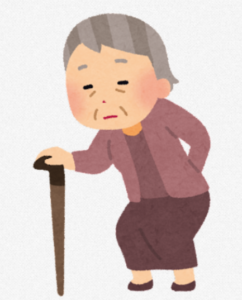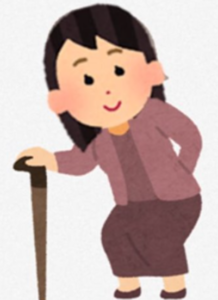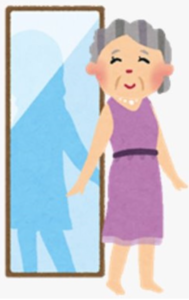「未来を旅した…」と言ってもタイムマシンの話ではありません。でもその洋書、久々に実に面白かったんです。
全米で大ベストセラーになった「DIsguised 」(邦題「変装ー私は3年間老人だったー」)
筆者はPat Moore(研究者・企業家)。universal design(誰にでもやさしいデザイン)の提唱者の一人。
本のネタは彼女が50年程前、大学院生時代に行った奇抜なフィールドワーク(実地調査)。老人問題の研究のために、「老人になるとどうなる?どう扱われる?」を実感したいと、自ら映画の特殊メイクで26歳から80歳の老婦人に大変身。米14州116市を3年回り「老いた」自分に対する人々の反応を見て回ったそうです。その実体験やら考察やら、という本です。
ではなぜそんなに面白かったのか?理由は2つ。
まず彼女が当時の米国で体験した老人への偏見や固定観念が、退職後の自分が「うん、そうそう」と実感できた点。
例えばマンハッタンの文房具屋での買い物の体験。
老女・若い女の2バージョンで行った興味深い調査。
まずは老バージョン。「he」は店員。「I」 は80代に変装したPatさん)
ーーーーーーー
I began looking for what I needed…He stayed at the cash register for several minutes
without greeting me…
(私が探している間、彼はレジから離れず挨拶もしない。)
“Do you need something?” he barked.
(「何が入用?」と彼は吠えた。)
“A ribbon for my typewriter,”…
(「タイプライターのリボンです」)
“What kind?”
(「種類は?」)
”A black one.”
(「黒」)
“No,no,no!” What kind of typewriter do you have?”
(「違う、違う、違う!タイプライターの種類を訊いてんだよ!」)
…ようやっと支払いの段階。
「3ドル24セント、税込み」とぶっきら棒に告げられる。
ハンドバッグがなかなかあかずもたもたするのを彼女が弁解しても無反応。
お釣りも無言で渡され、紙袋に無言で放り込まれ、さっさとレジから離れる。
ーーーーーーーー
この辺り言葉少なめなら日本で普通かも。
翌日老人メイクなし26才の女性バージョン。同じ文具店で、同じ服で、同じ物を、同じ店員から買います。
彼の対応はどうだったでしょう?
ーーーーーーーーーー
店に一歩入った途端に、昨日の彼が
”Yes, miss? May I help you?”
とテンション高め。
タイプライターのリボンを探していると言うと
“And what kind would you like, miss?”
(で種類は何ですか?お嬢さん)
“A black one,” I answered simply.
(「黒よ」と私は単純に答えた。)
“Oh, no!” he laughed, “I mean what kind of typewriter do you have? They are all different, you know!”
(「いやいやそうじゃない!ハッハッ!タイプライターの種類って意味ですよ。色々違うでしょ、ね」)
買い物が終わりレジで。。
Are you sure you don’t need anything else with that now?
(「他に入用なモノはホントにありませんか?」)
That’ll be 3 dollars 25 cents with tax, he said politely.
(「それじゃ税込み3ドル25セントですね。」と彼は礼儀正しく言った)
5ドル札を渡すと、お釣りを丁寧に数え、
Now we’ll get you a bag here and you’re all set.
(「じゃ袋に入れてと..これでOKですね」)
私が無言でドアに向かうと、後から小走りに追いついてきて
“Let me get that door for you,” he offered, “It sticks sometimes”
(「代わりに開けましょう。時々固いんです」)
とまで。(p77-81)
ーーーーーーーーーー
彼女が言う「老人は無視され追い払われ見過ごされる。まるで家具か壁紙の一部かのよう、また価値が低いかのように。それを痛いほど実体験した」と。
日本では老人に対して、失礼な幼児語が多いのでは。「2000円になりますね~、そうね~、よくできたね~、偉いね~」のように!
さて私が面白かった2番目の理由。
それは固定観念の正体と対処法がはっきりしたこと。
若い頃は実感できませんでしたが、一般的な「老人」と一人一人の「年を重ねた人」とは別モノ。考えてみれば当然ですが偏見は一般的なイメージ。一人一人の実際とはずれがあるんですね
例えば「老人は頑固だ」と言う先入観。でも各々「頑固さ」は違います。すごく頑固な人もそうでない人も。中にはかなり発想とか柔軟な人も。
(私は自分はとても柔軟な方だと思います。…誰が何と言ったって絶対に自分は柔軟です!!w)
冗談はともかく、自然なありのままの自分でいいのに、つい固定観念の方がホントに見えて、そちらに合わせなきゃってなりがちでは。
「頑固さ」の例でいうなら、自分はホントは頑固じゃないのに頑固だとか、頑固にしなきゃと思うのは変ですよね。
ここが胆。Patさんのちょっと硬い言葉だと…
The most brutalizing effect of prejudice is that the victims come to believe firmly at a deep… level, the stereotypes …
(偏見の最も残酷な効果は….犠牲者自身が固定観念を深いレベルで確信するようになる点だ。)p146
まとめると、老人への偏見や固定観念は、一般的なイメージで人を縛る。
囚われず自分らしく「年を重ねよう」….とこの本が教えてくれたようです。
正直私も昔老人に偏見がありました。それなのに、今回偏見を浴びる番になったら信じ込むな…は少しズルいかも。
ただ「私も昔老人に偏見..」の告白は、私より年下の?あなたには当てはまらない(か?)
See you soon!
Jiro
↓ ↓ ↓
追伸:
◯「Disguised」 by Pat Moore
https://amzn.to/48fodJq
◯「変装―私は3年間老人だった」パット=ムアー著 木村治美訳
https://amzn.to/3Tzk92j
知ってる内容を英語ルートで理解。
↓ ↓ ↓
I hope you’re doing well. I want to share with you an amazing book I recently read. I was so into it that I couldn’t stop reading until I finished it in just one day!
The author, Pat Moore, is a few years older than me and well-known for starting to promote “universal design.” This book is about her experiences when she was 26 to 29 years old. As a graduate student, she came up with the idea of pretending to be an octogenarian to see how people would treat her. She traveled to more than one hundred cities in the USA and Canada.
What made this book so interesting to me are two things. First, I could relate to what she went through during her research, especially after I retired at 63. She talks about how elderly people were not treated well in America at that time. For example, in a store in Manhattan, she was treated coldly when she tried to buy a typewriter ribbon. The next day, when she went back as her actual 26-year-old self, the same clerk treated her respectfully and even opened the door for her.
In Japan, her experience might include being treated like a silly little girl, with people talking to her like, “Yeees, vvvvvvery, goooood. You are a goooood girl1” if you know what I mean.
The second reason I loved this book is that it helped me understand what prejudice and stereotypes really are and how to deal with them. Prejudice is a preconceived idea about a group of people, ignoring their individual differences. It’s important not to believe or support these ideas, as the most harmful part is that victims themselves start to believe these stereotypes deeply.
This is true not only for stereotypes about old people but also for stereotypes about women, nationalities, and more. Let’s live our own unique lives!
See you again!
私立学校に英語教師として勤務中、40代半ばに差し掛かったころ、荒れたクラスを立て直す策として、生徒に公言して英検1級に挑戦することを思い立つ。同様の挑戦を繰り返し、退職までに英検一級(検定連合会長賞)、TOEIC満点、国連英検SA級、フランス語一級、スペイン語一級(文科大臣賞)、ドイツ語一級、放送大学大学院修士号などの成果を得る。
アメリカで生徒への対応法を学ぶ為に研修(地銀の助成金)。最新の心理学に触れた。4都県での全発表、勤務校での教員への研修を英語で行う。現在も特別選抜クラスの授業を全て英語で行っている。「どうやって単語を覚えればいいですか?」という良くある質問に答える為、印欧祖語からの派生に基づく「生徒には見せたくない語源英単語集」を執筆中。完成間近。常日頃洋書の読破で様々な思考にふれているが、そうして得た発想の一つを生かして書いた論文がコロナ対策論文として最近入賞。賞品の牛肉に舌鼓をうっている。元英検面接委員






